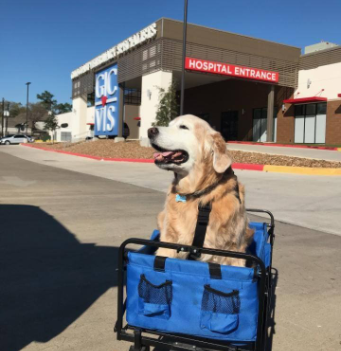Caring for Your Pet Through Their Golden Years

#1: Provide your senior pet easy access to important resources
Mobility issues can affect your senior pet’s ability to reach their food and water bowls, litter box, or outdoor elimination spots, particularly if they need to go up or down stairs. Consider adapting your pet’s access to these resources:- Food and water bowls — Dehydration is a common problem in older pets who may find repeated travel to their out-of-the-way water bowl too taxing. Place several food and water bowls throughout your home so your pet can easily drink whenever they feel thirsty.
- Litter boxes — Older cats commonly develop lower back arthritis that makes stepping over high litter box edges difficult. If your cat has accidents on your floor, particularly next to the litter box, they may be unable to lift their legs high enough to get into the box. Provide your senior cat with several low-sided litter boxes in easy-to-access locations to make their litter box trips easier.
- Elimination spots — Senior dogs commonly have accidents in the house, often because they cannot hold on for long periods, or their mobility issues prevent them from getting outside in time. Understand that your senior dog does not want to disappoint you, and making appropriate elimination easier for them will bolster their confidence and mental wellness. Take your pet outside often, or provide an indoor elimination area using puppy pads or artificial turf.
#2: Help your senior pet get a grip on slippery floors
Pets who are unsteady on their feet due to arthritis or balance problems may find navigating hard, slippery floors daunting. They may avoid walking on hard surfaces and restrict themselves to a small area because they fear falling, leading to house soiling and isolation from beloved family members. To help your senior pet move around your home more confidently, make a path of rubber-backed rugs or mats on hard floors. You can also use toe grips to help your dog gain traction and walk more steadily.#3: Recognize cognitive dysfunction signs in senior pets
Aging brings expected changes in your pet, but more extreme behavior changes may indicate an abnormal condition. Dementia, or cognitive dysfunction, may cause a number of behavior changes, but proper treatment can mitigate issues and maximize your pet’s quality of life. Cognitive dysfunction signs can be explained using the acronym DISHAA:- Disorientation — Pets with cognitive dysfunction may seem lost in their own backyard, or become stuck behind the couch, or in a corner.
- Interaction changes — Pets may no longer seek attention, or seem grumpy or withdrawn.
- Sleep-wake cycle alterations — Referred to as sundowners dementia, this aspect of cognitive dysfunction often causes pets to wander aimlessly, pace, and vocalize at night, and sleep more during the day.
- House soiling — Pets with cognitive dysfunction may forget where they normally eliminate, or no longer understand that eliminating in the house is unacceptable.
- Activity level changes — Pets may no longer seem interested in playing with toys, family members, or other pets. Some may wander aimlessly, pace, or develop repetitive behaviors, such as circling, licking, or chewing.
- Anxiety — Affected pets often become more anxious when separated from their owners, or encountering new environments or situations.
#4: Provide your senior pet regular veterinary care for early disease detection
As your pet’s body ages, they are more likely to develop diseases and conditions that require medical care. Many problems can be managed to provide years of quality life, if detected early. Changes can occur quickly in your senior pet’s body, so annual veterinary visits may not be enough to keep you informed about their current medical status—typically they require visits every three to six months to keep tabs on their ever-changing health. Regular exams, bloodwork, and specialized tests can detect common medical conditions in senior pets, including:- Heart disease
- Kidney failure
- Dental disease
- Liver disease
- Arthritis
- Cancer
If your primary care veterinarian detects disease in your senior pet, GCVS will partner with them and you to provide the most advanced treatments and therapies. Contact us to discuss treatment options that will help your family make the most of your pet’s golden years.
